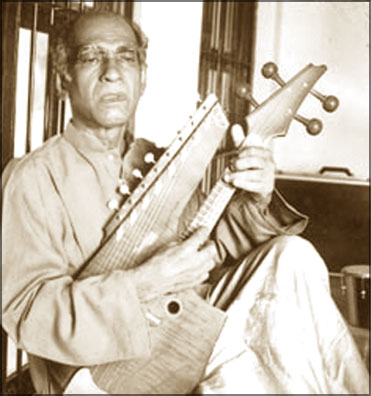Amaradeva @ 85
By Kalakeerthi Edwin Ariyadasa
Amaradeva, literally, the name implies “Immortal God”. With the
appellation ‘Pandit’, the name has established itself as a household
word. But, how did this name originate?
Was this conferred upon him by his prestigious Alma Mater –
Bhatkhande Musical University in India? Or else, was it given by Prof.
Ediriweera Sarachchandra, as some tend to believe?
 |
|
Pandit Amaradeva |
Whatever may the origin be, it is well-known in intimate circles,
that ever witty and jocular Ediriweera Sarachchandra adapted it to the
moniker Amaaru Deva (The God who is difficult to be got hold of.)
The eternal cadences of the endless waves of the Indian Ocean, must
invariably have provided a rhythmic inspiration to the soul of infant
Amaradeva. His childhood village Koralawella, existed in cozy adjacency
with the sea.
Attention
The ultra-sensitive little Amaradeva, would have listened with rapt
attention to the many voices of the deep waters that formed part of his
childhood environment.
I say this with good reason. I have seen on many an occasion, how,
mature Amaradeva listens with sustained absorption to another person,
without interrupting him in his say. This rare variety of outstanding
‘quality’ listening, can emerge only as the end-product of disciplined
lending of the ears, over a long period of time. As a routine process
the exquisite listener has evolved eventually into a spell-binding
vocalist.
As part of my own growing up, I have been able to witness the amazing
evolution of Amaradeva from youthful vocalist to world-class singer and
musical genius.
Way back in the late 1940s, I was an undergraduate at the first
university of this country - ‘ University of Ceylon.’ The stern but
benevolent Vice Chancellor Sir Ivor Jennings was the Supreme presiding
genius, whose spirit fully pervaded this pioneering institution of
tertiary education. Although, later on, Sir Ivor famously and crushingly
declared that Sri Lanka was a “cultural desert,” art and culture
blossomed surprisingly during Sir Ivor's tenure.
As part of this aesthetic reawakening, the undergraduate community of
that day, launched a musical “Mela.” The venue for these cultural events
was “Samson's Bungalow”, a building that has now vanished, bowing to the
irrevocable imperatives of relentless time.
Sunil Shantha
Those undergraduates, who foregathered at these musical “Melas” at
Samson's bungalow, were regaled by two young exponents of music, Sunil
Shantha and W.D. Albert Perera.
Foremost among the organisers of these ‘Melas’, was music –
enthusiast – Vinnie Vitharana (now, Prof. Vinnie Vitharana). He would
occasionally go along to Koralawella, Moratuwa, to bring along W.D.
Albert Perera, a young violinist. Their common attachment to music
linked them together with intimate ties of friendship. The
undergraduates were fascinated by these musical sessions. The co-eds of
the day especially loved them. The compelling force was not only the
music. The presence and the personalities of the musicians too exerted
an enticing charm.
Back then, Don Albert Perera, was not that much of an eminent
personality. Music played a prominent role, in his early childhood. His
father, in the course of his professional work, repaired musical
instruments. Child Albert would have handled those musical instruments
as readily available toys.
Violin
His father presented him a violin. Some say it was made of wood.
According to others, it was a tin violin made in Japan. Those details do
not matter functionally. The crux of the matter was, that the musical
enthusiasm of youthful Albert Perera, progressed in leaps and bounds.
‘Partying’ was very much a part of the lifestyle of the Moratuwa folk –
then, as much as today. Young Albert Perera and his violin would add to
the zest of these folk get-together. With time, Albert Perera, acquired
a folk-popularity.
Keenly ambitious, young Albert Perera, yearned to strengthen his
built-in musical enthusiasm, with a substantial academic discipline.
India beckoned him, as a traditional “Temple” for those devoted musical
pilgrims.
But, funding proved a sizable obstacle. When other sources failed,
the masses he entertained in his own way, came to his rescue. They
raised the financial provisions he needed.
At Bhatkhande Music School in Lucknow, India, his gurus discovered
his wealth of talent. They tended it with ready assistance. And W. D.
Albert Perera from Sri Lanka emerged brilliantly to his true destiny.
Returning to Sri Lanka as Amaradeva he dominated the aesthetic
landscape of mother Sri Lanka. When the Sinhala cinema was born in 1947,
he acquired a re-incarnation as singer, dancer and actor.
Eventually, he proved a life-enhancing force of the new medium,
playing a complex role as music Director and background singer.
With a well-directed effort, he brought about a seamless fusion of
living folk rhythms with age-old, time hallowed ragas. As an exponent of
profound music, crafted to fit the folk rhythms and mass frequencies, he
ushered in an era of new and escalated music.
Talents
The world - especially India - has recognised his talents amply.
India conferred upon him high national honours. He is an awardee of the
prestigious Magsaysay Award presented by the Philippines.
At 85, Pandit Amaradeva is just five years young to me. (My birthday
is Dec.3 1922). I have been with him in numerous private, personal and
formal occasions. In all these, what comes through vividly is his
genuine, true sense of humanity.
There is not even a trace of ersatz either about his music or his
personality. The avid attention and the total absorption with which he
listens to people, to my mind, is indicative of the ever-curious child
that lurks within him perpetually.
I am now 90. My full-hearted wish is may he reach my age safely and
soundly and surpass it.
Amaradeva is the unified lyrical voice of the whole nation.
When he sings, the whole nation sings with that voice.
Amaradeva – immortal god.
But then, how did that name originate?
|



